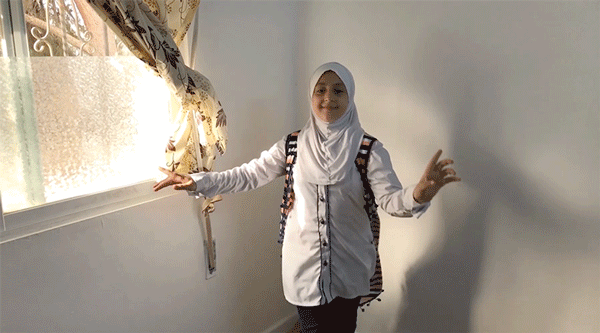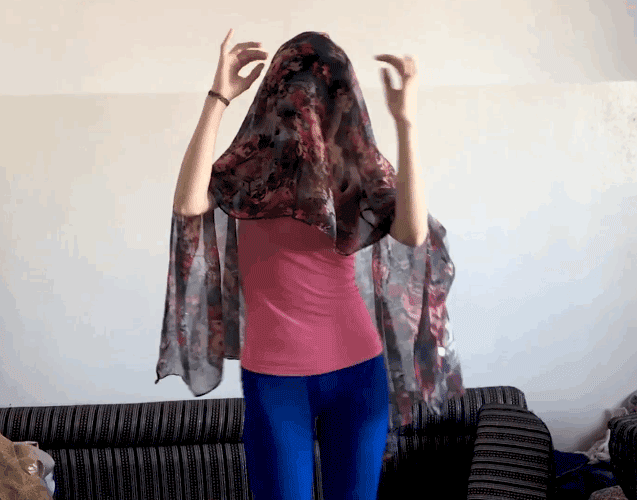Tomorrow There Will Be Apricots
by Tanya Habjouqa
Five years in the lives of Syrian women in Jordan (2012-2017)
في المِشْمِش
"The Syrian crisis devastated a country I knew and loved.
I was, by chance, conceived in Syria, when my parents took a romantic excursion from neighboring Jordan. In 2005, I lived in Damascus for nearly a year. Afterdocumenting Iraq at the start of the US occupation and witnessing firsthand the beginning of its unraveling, I wanted to work on a different kind of Middle Eastern story, one without violence and war. While it might now seem ironic, back then, Damascus appeared like the answer to my wishes. Not only could I study Arabic at its renowned language schools, but I could also chase stories not tied to a horrible news cycle, about Sufis and mysticism for example – all while wandering the enthralling streets of the world’s oldest still existing city. Of course, I always knew darkness surrounded the country. The very stability of Syria was extracted at a heavy price. Dissent was not tolerated, neither speech nor association was free, and the notorious prisons of the Syrian regime were full of those who would object.
Tomorrow There Will Be Apricots is born out of the current terrible moment, when even greater blackness has enveloped the country.
As a photojournalist, I was often assigned to cover the spillover into Jordan of Syria’s disaster. But after each story was finished and filed, I still had endless material that was outside the scope of those assignments but needed to be shared and at the same time, needed a different kind of canvas to be more fully explored. After all, much of what defined these Syrians’ lives were the absences – of both people and places. But how do you photograph what isn’t there? To overcome such challenges, I worked collaboratively with the people I photographed to create these performed portraits.
This project is, therefore many things: study, investigation, documentary, reenactment, archive, rumination, and even séance, for those desperate to resurrect the dead or confront the past and its ghosts.
All names have been changed to pseudonyms at the request of the interviewees’ for their protection."
- Tanya Habjouqa, 2017
Chapter One: The Martyrs' Wives Building
At first, the people said revolution! Ordinary men – transformed – became freedom fighters. With such romantic hope and expectation mounting in parts of Syria in 2011, women fell in love with their husbands anew.
Yet we would not know this until the men were away at the front lines.
When, in 2012, we first met these members of the Free Syrian Army (FSA), as they plotted revolution in Syria from the safety of Amman, Jordan. All we saw of their wives was a hand deftly offering us visitors trays of coffee and tea.
Only when their husbands returned to Syria to fight, did we finally meet. And they regaled us with tales of their lust, love, fear, and hunger. But then, one by one, their men died. Some said, so too did the revolution. It was, others said, stolen. The protracted fighting had taken a dark and then darker turn. Fighters came from outside of Syria, factions proliferated, and soon, the idealism of the early days of uprising had all but disappeared.
As it became clear that the Syrian regime would survive, countries like Jordan, that had hosted opposition fighters and their families – soon to become their survivors – grew less welcoming.
The 654,582 registered Syrian refugees in Jordan live both in designated camps and in the cities, in whatever housing their means will allow.
For the women in this chapter, who have lost their husbands to a war for a country to which they cannot return, home is now the martyrs’ wives buildings.
The six-floor concrete apartment building, where we met the women photographed here, has a cloth banner imprinted with the words “martyrs’ wives” hung from its roof. The identification leaves the residents exposed and vulnerable, even when intentions are good. In the first year, men approached the apartments asking if the women were available for fun or for marriage; others asked about their daughters. To protect their young girls, many mothers forbid them from attending school after puberty, leaving their daughters trapped, day in and day out, inside rooms with windows framed by ugly curtains.
Jordan, 2013, Samira, a 22 year old female head of house hold with four young children. She fled Homs with her small children, while her husband insisted on staying to look after their home and assets. She learned four months ago that her husband had been murdered.
Jordan, August 2014, 'Selene', 36, (mother of Hala) still keeps her husbandís favorite white slacks, fantasizing he will return. He went missing for seven months in Syria, before she learned of his fate. She refused to see the digital images marking his death.
Wanting to share their experiences but also remain anonymous, the women repurposed these very draperies, using them to perform their stories for the camera while hiding their faces.
Why did you leave me when I needed you?
Jordan, 2012, "Aysha", 30, has been widowed for one year after 11 years of marriage to her husband, who was a fighter for the Free Syrian Army. Here, she shows a tattoo on her shoulder that reads, “Why did you leave me when I needed you?”
The tattoo relates to a dramatic quarrel the young teens had when secretly dating – upon making up, they each had the tattoo made as a reminder of how horrible it was being apart. Aysha never imagined the tattoo would take on such a dramatically different meaning years later.
Jordan, 2012, Aysha’s daughters during a heat wave, stuck in the apartment, windows yielding little breeze. After their father died, their mother was encouraged by her in-laws to remarry to lessen the financial burden on the family. Aysha’s three young daughters are not allowed to live with their mother now, but remain with their grandparents.
According to a report by Save the Children, 35 percent of the 4.8 million Syrian refugees in the region are of school age. Whereas before the conflict, 94 percent of Syrians attended primary or lower secondary school, by June 2017, 43 percent of Syrian refugees are now out of school. Many of these include girls living in Jordanian cities, who upon reaching puberty, are kept at home due to fears for their safety and of sexual harassment. Any tarnishing of their reputation may hurt their chances for marriage, which remains for many, the only hope to improve their situations. The women’s fear is rooted in being outsiders in the places in which they have taken refuge. They worry that strangers from another country (not their own) will not protect their daughters; some feel outright preyed upon.
When Abu Layla was alive, he would send Aysha sultry texts, poems, and images from the front lines. It was by text message she found out that he was killed while fighting in Syria. When her old Nokia died, she lost her trove of memories. This is the only image she has from that time before his death.
In Her Sleep
Layla, 13, (right) and Sama, 15, (left) stand for a portrait weeks after finding out their father had been killed in Syria. At the news of his death, their mother was pregnant with her sixth child. Barely widowed, she was under almost immediate pressure to marry off her two eldest daughters. She resisted and found refuge in Aysha’s building. Layla remains shell-shocked after being trampled upon in her sleep by an entire Syrian regime unit. They stormed her house in Daraa searching for her father just before the family fled to Jordan in 2012.
Children were an exception to the fear of being identified in a photograph. Layla fell just shy of the age of being inappropriate to photograph. That changed the following year, when her face, too, needed to be obscured.
Jordan, 2014, Seven miles to the Syrian border, view from Jordan’s highway to Ramtha, one of the most populous Syrian refugee communities.
Jordan, 2013, “Do not expect me to get married like my sister. I want someone to fall in love with”Hala insisted the day this photo was taken at the start of summer. By the end of the season, she was considering a proposal from a Saudi who she had yet to meet in person, tired of wasting her days staring at same four walls and “slowly dying.”
“Do not expect me to get married like my sister. I want someone to fall in love with”
Hala, another young neighbor, also ‘celebrates’ her sister’s wedding, jovially trying on her wedding night negligee. A divorcee at 18, after only twenty-five days of marriage, Hala was forced to marry her abusive cousin after her father was killed in their hometown of Daraa. Now 19, Hala is about to see her younger sister marry a Syrian man she’s met only three times in two weeks.
Hala passes her hours “counting ants”, as she says, referring to the crippling boredom of her unrelenting confinement. She writes poetry and secretly accesses the outside world and inspiration through the internet on her hidden cell phone. A visiting uncle caught her once with a laptop. He beat her and threw the laptop, as well as her clothes, out the window to ensure she did not leave house and that she “behaved” both indoors and out. Hala became a muse to us during the five years we met with her, eagerly using the curtains as a stage and acting out her stories.
Once Her Crowning Glory
Jordan, 2013, Poet Hala’s grandmother, 88, brushes her vibrantly dyed hair.
Poet Hala’s grandmother, 88, brushes her vibrantly dyed hair, once her crowning glory. Her son died fighting in Syria. She had advised him on his wedding night to slap his new wife once, to assert his authority. Despite that abrupt beginning, the marriage had been a happy one until his death. Her granddaughters are respectful but quietly laugh at the elderly woman’s advice about how women should live. She died one year after this photo was made, a Syrian refugee in Jordan.
Chapter Two: Syria via Whatsapp
Jordan, 2014, Five year old Shams displays her healing hand... She is regaining full use of her hands slowly after multiple surgeries.
The draw to Europe seduces entire families, but most often, because of the high risk and financial cost, it is the adult men who first make the journey. The usual plan is that the women and children will follow through family reunification channels, once the men have legal residence in Europe.
Jordan, 2014, Muna, a Syrian "urban refugee" and female head of house shares photographs of her husband from Germany. 'I swear each photo of him standing in the sun, or by an old church...you see devastation and guilt on his face. He wants to be with us so badly. We survive off of this photos and the lullabies and love messages he sends us on whatsap.' Her daughter's hand reaches for phone.
Jordan, 2014, Cell phone image of teen daughter who made journey alone to Germany. "I could not stop my daughter , she insisted. She said she could not bare to see me so tired, frightened for their future. That as they got older, it would only get worse as their need for education would increase with no income. She did this for us." says her mother, Rawa, a 37 year old Syrian refugee.
But those they leave behind – often just miles from the Syrian border – must wait for the call to join, without any guarantees they will ever be able to reunite with their men. Whether in refugee camps or in squalid rented apartments in the cities, these women and children are trapped in an acute cycle of poverty, isolation, and anxiety as they wait for the promises of the men of new lives in Europe to come true. In the meantime, many mothers watch their underage sons toil for scraps to help the family survive. Some families say the men who do choose to stay become more broken by the day. Unable to legally work and at risk of being deported, they are stuck inside their shelter, with little to do or show for their lives.
The guilt of those who make it to Europe is present on their stricken faces in the photos the men send back to their families. Their haunted eyes and sheepish smiles stare out from smartphone screens – their hunched shoulders framed by the green of Swedish forests or the red brick of quaint German towns. In the messages they record and transmit over WhatsApp, they speak words of encouragement and promises of a better future. They sing lullabies for their wives to play to their children as they sleep.
Father and daughter share a tender moment. Muhammed Amer Khalaf, 40, from Daraa, worked as a mechanic and farmer in Syria. He and his eldest son Rajeh, 13, were rushed into Jordan in June 2014 for emergency medical treatment after the car they were driving in Syria was bisected by a rocket. Rajeh lost both his legs in the impact, while his father lost his right leg and seriously injured his left. With father and son both confined to wheelchairs, they struggle to cope with the camp’s rocky desert terrain and rely heavily on Muhammed’s wife, Jihan, to care for them and the couple’s three other children. The family is on a list to be resettled in Germany.
While she was taken, a sniper killed her husband
Myriam barely had time to hide her breastfeeding infant under the blankets when she heard the men breaking into her apartment. As regime forces dragged her into a car with her mother and teen brother, she screamed at the neighbors to watch the kids. She believes the men were looking for her husband. Hooded, she did not know which police station they were all taken to. She did not think anything could be worse than watching her 17-year-old brother’s fingernails being pulled off. But then the men stripped her naked and threw her into a cell full of women. She was on her period, and the women ripped the garments they did have to give her rags to stop the flow. Then the men came again, taking her away to a dark room. Most did not mind that she was menstruating and repeatedly gang raped her. Her voice breaks as she describes the humiliating positioning of her body for their pleasure. She breaks into uncontrollable sobs describing this. The commander, however, said he would wait until she was “clean.” As promised, he came for her a few days later. When he noticed she was lactating, he sucked her breasts as he raped her, laughing “Oh, you must have a baby somewhere? Shall we find your baby?”
Jordan, 2015, Myriam is a 23-year-old widow of three young children struggling to survive as an urban refugee. She is luckier than most, she has found a job in a salon. She also does not discuss the torture and rape she endured on the outskirts of Damascus. She waits until her kids are asleep to break down and cry. She is determined to never let them know what she suffered. Here she has enough for the rent, barely. But she can’t fathom a future for herself or children in an unchanging status quo. Two of her three children are pictured: Lara, 7, and Muhammed, 6
"Kill Me Instead!"
Fadia, 19, traces cracks in the walls of her rented apartment as she describes the death of her father. After returning home from his job as a construction laborer, shortly before the dawn prayer, he collapsed right away onto his bed, dusting the sheets with the debris that fell from his work clothes. Not long after, the shabiha (pro-regime militia) burst into their home and shot him, execution style, in the head. He had barely woken up. When Fadia’s little brother wailed in fear, the guns were turned on him. Fadia screamed, “Kill me instead!” Both were spared. She now lives with her aunt on the outskirts of Amman in a crowded one-bedroom apartment with fifteen extended family members. They survive by digging through trash containers and finding remnants of bread to dry and sell to herders. This earns them a couple of dollars a day.
Chapter Three: This Is How I Danced, This Is How I Cry
“She lives in a toilet.”
“They gang raped her and sipped on her lactating breasts, mocking they would find her infant next.”
“I am dead inside. There is nothing.”
“We sang…but we did it softly.”
Looking back at my notes from over five years of interviews with Syrian refugees in Jordan – following the same families, seeing the men die, the women struggle, and the children stagnate – I did not think their lives could get any darker. I was wrong.
“We have a saying: A girl is like a piece of glass. If it breaks, you can’t put it back together.”
These refugees are all but forgotten, aid has dried up, and one of the few ways out – the path to Europe – is now full of nearly insurmountable obstacles. Many of these Syrian families in Jordan have yet to be reunited with the fathers and sons who did make it to Europe. Women and children whisper about increased sexual abuse, afraid to officially report it. As a Syrian doctor aiding the community secretly (he is not allowed to practice in Jordan) explained, there is a rational fear of deportation should refugees raise their heads and complain. What is most jarring is that this is normal everyday life now.
This last chapter is dedicated to Hala. She intimately invited me in from the beginning, and despite all that she has endured – including her recent short-lived marriage during which she says her mother-in-law severely beat her – she still recites her poetry and performs her stories visually.
Girls play on a roof in Ramtha, just four kilometers from the Syrian border. Radio Syria is sometimes available, ironically mixing optimistic news, horoscopes, and an array of classic Arabic tunes and pop.
My feelings are dead now. I’m 31 years old, widowed at 27. My feelings are dead. My feelings are dead. I now hate men – the sheiks managing the martyrs’ wives building tell us that men are human wolves who want something in exchange for helping you. We became scared for ourselves and our daughters.
– Um Fadi
Five years after I first met her, widowed Aysha was pressured to remarry.
In 2012, I found a woman madly in love with her husband and generous with sexual advice to her fellow fighters’ wives. These women were living for the day when their men would return. None of them did and, in time, Aysha’s turn came to mourn her husband’s death. Still, she remained rebellious, mischievous, defiant, and playful.
Five years on, I barely recognized the lively woman who had shown me the tattoo that symbolized her true love. She was now remarried to a Jordanian man. Her in-laws had pressured her within months of their son’s death to accept the proposal so that she’d be one less mouth to feed in their household. Within a year and a half, she bore him two children. Her in-laws kept her three daughters by her first husband, the one she loved. She aches to be with them, fearing they could be deported.
On the day of this portrait, I found Aysha a broken woman. She was, of course, tired in the way women with babies are, but something inside her had also been extinguished.
Hala's Wedding Album
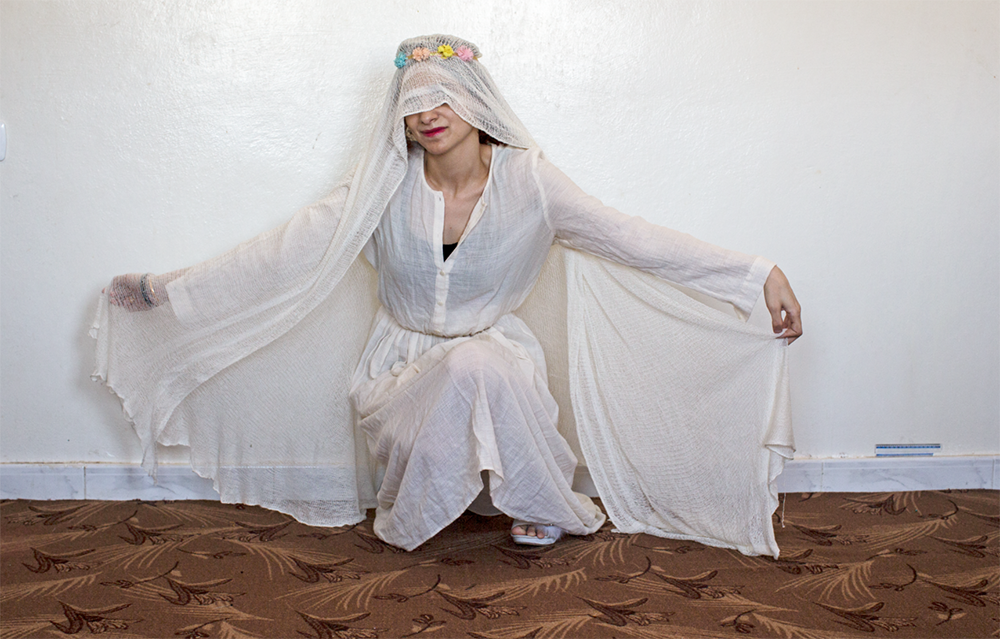
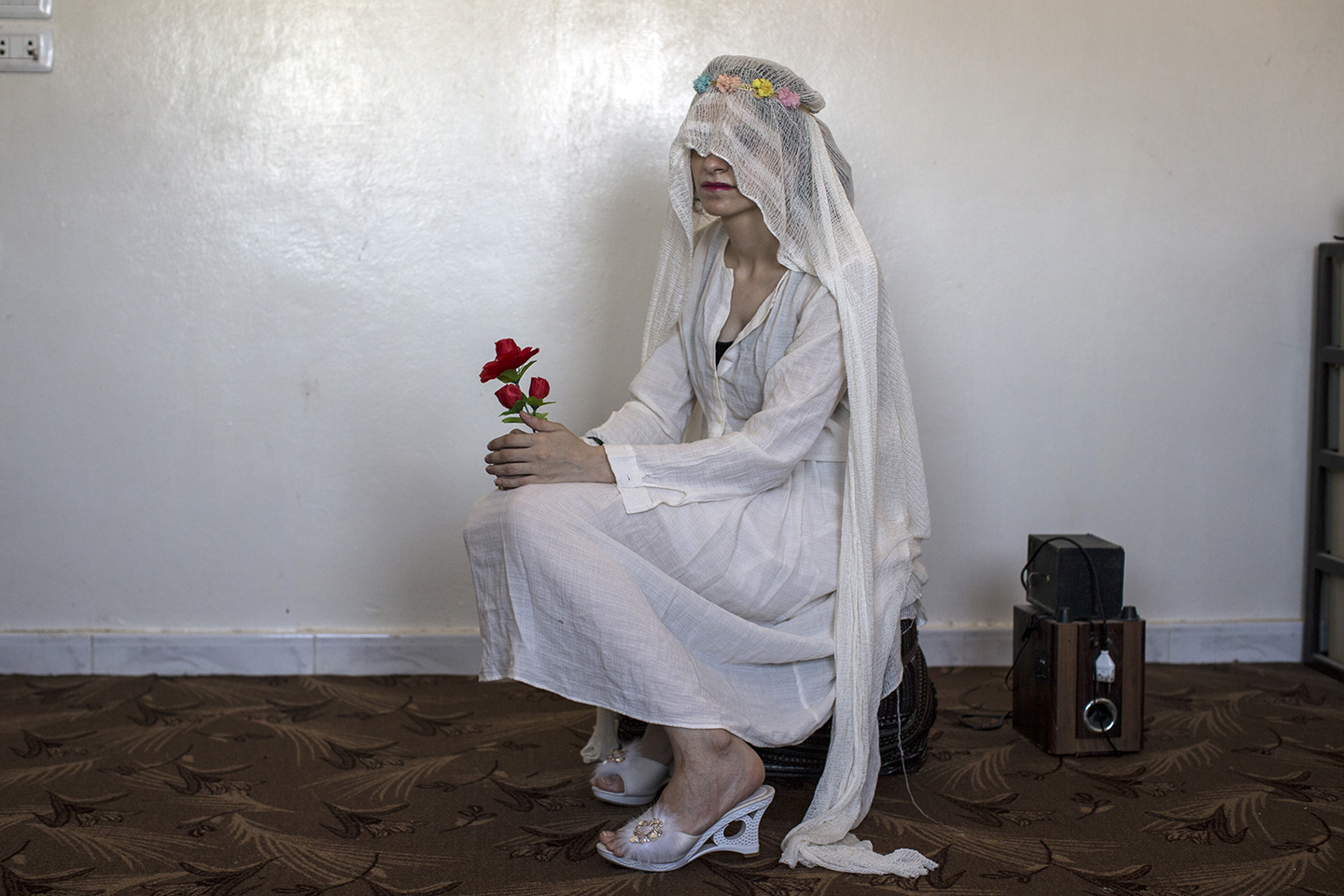

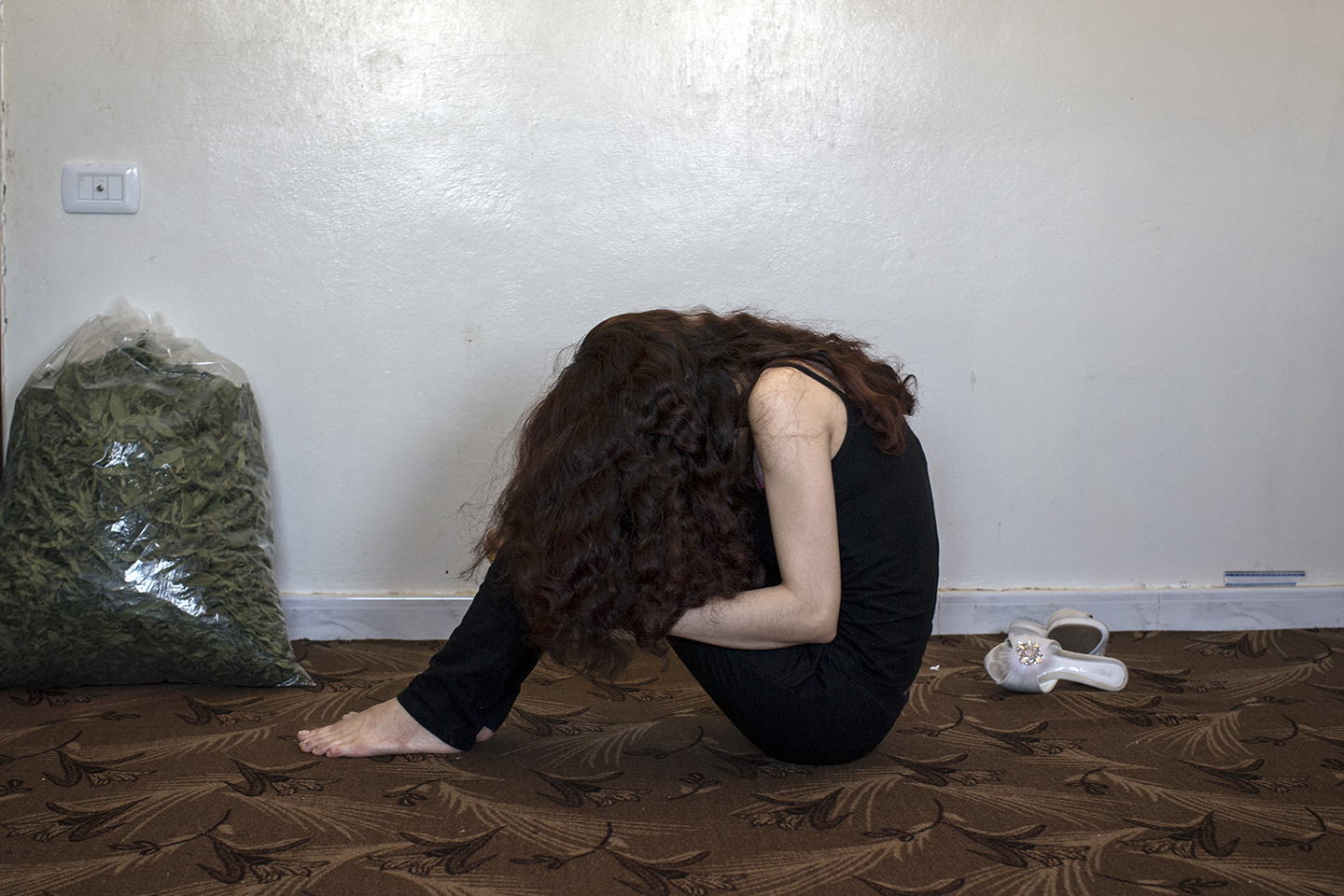
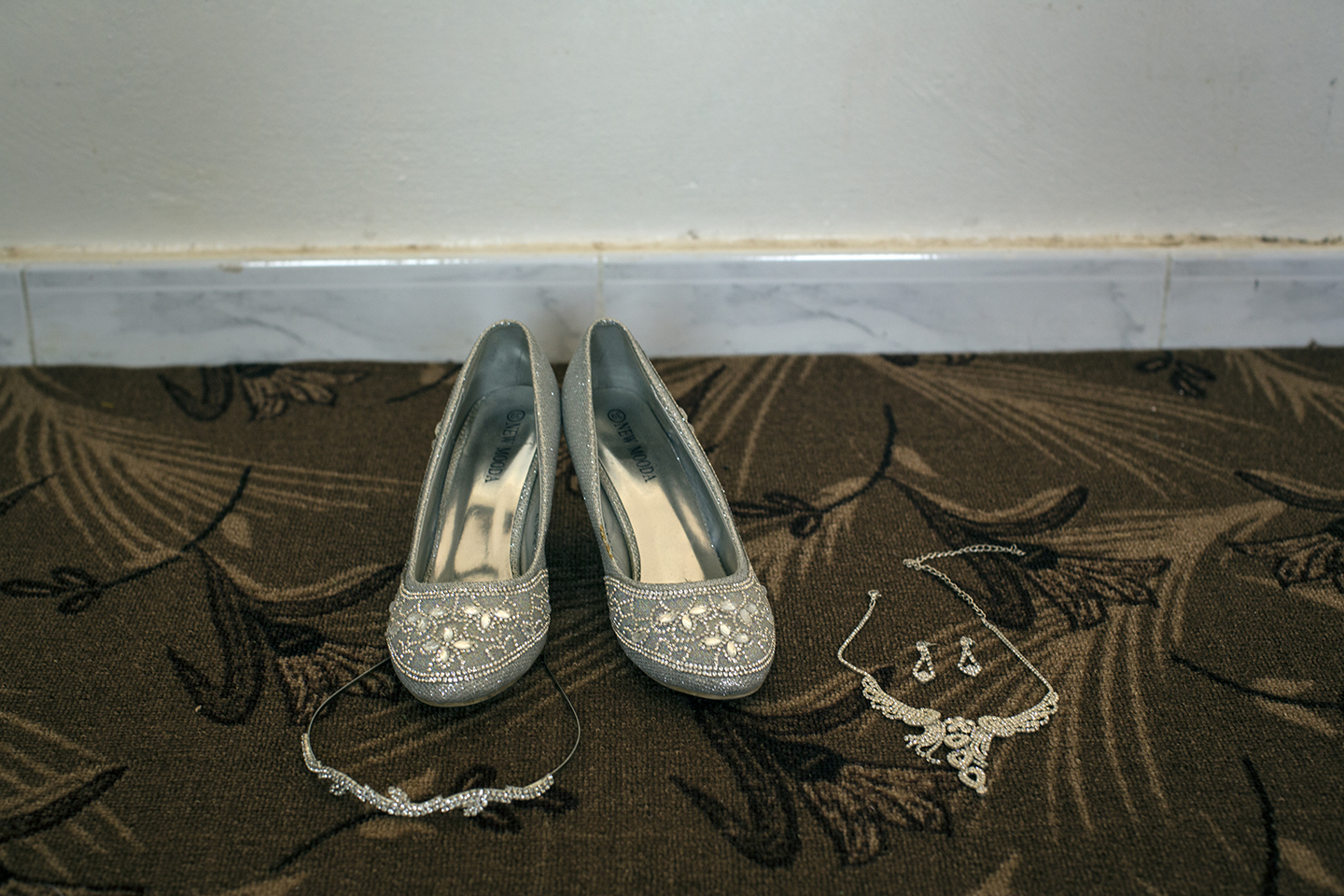
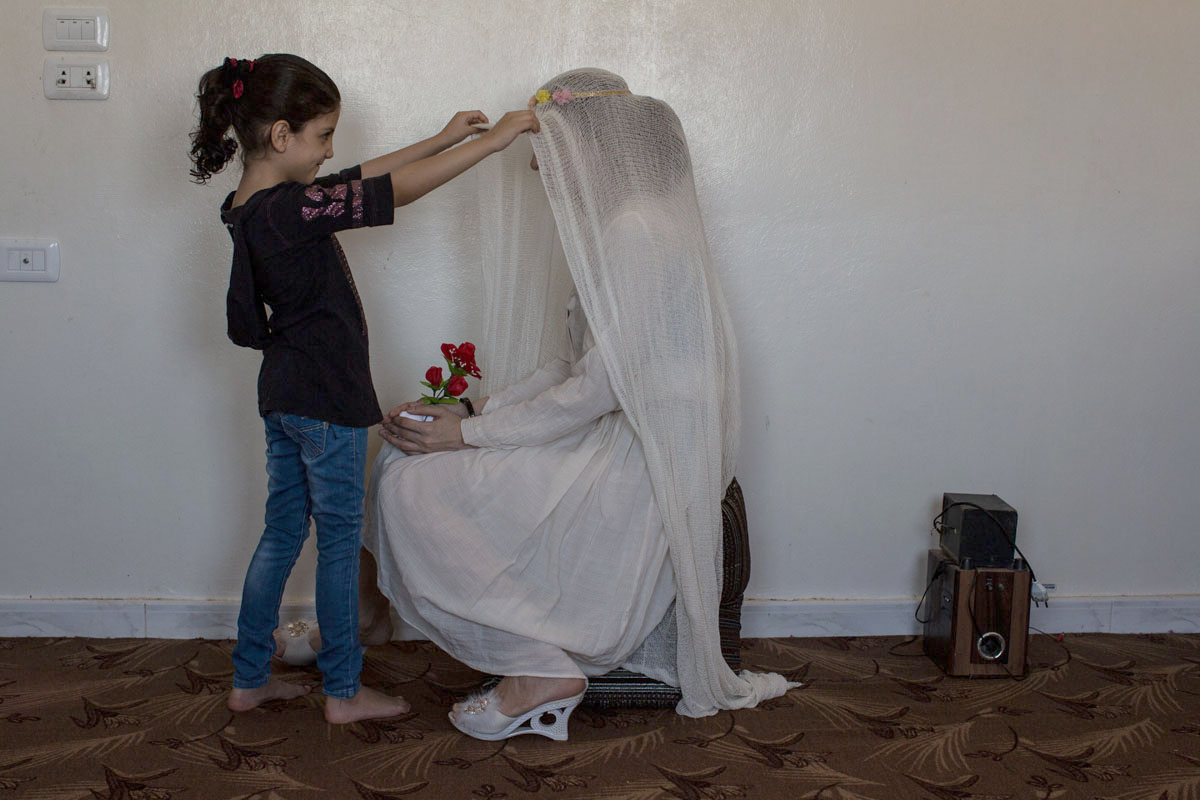
My friends asked me to write a poem about love. I told them I haven’t fallen in love but I will do one for them. They teased me after, saying that Syria is always on my mind:
My love for you equals the number of tanks in Syria,
My love for you equals the number of mothers’ hearts Bashar has shattered,
My love for you is till the death.
Love in the way of war.
Haven’t you figured it out by now?
That your lion is nothing but a panicked cat.
- Hala
Um Asim
I always feel like I can’t breathe. I feel it in my chest. I get tired from walking, if I shout, if I get sad, and things like that. My husband went to Europe and left us with two JOD. Two years alone with three children and not a dime. Not allowed to work. I am done. I am going back to Syria with my children. Whatever happens, I am done.
– Um Asim
Um Asim returned to Syria three days later with her three children.
She told them, “There are trees there.”
Testimonies
Gathered testimonies from 2012-2017. First-hand interviews, alias names, detailed stories of abuses by Syrian regime forces as relayed by refugees/civilians. Here, some of the stories of the men.


















